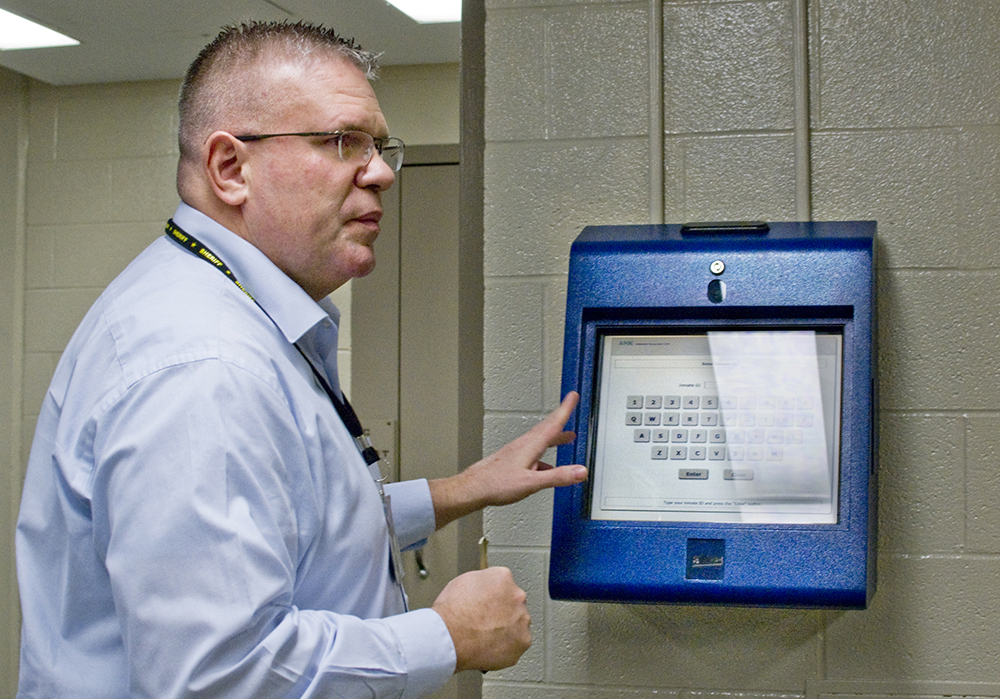
Peoria County Sheriff Brian Asbell demonstrates one of the kiosks in the Peoria County Jail used by detainees for voting. (PHOTO BY CLARE HOWARD)
Detainees at the Peoria County Jail cast absentee ballots for the statewide primary in March. They will vote again in the upcoming presidential elections.
Peoria County Jail Superintendent Ronda Guyton coordinated with Peoria County Board of Elections director Tom Bride to set up the process.
Jail detainees registered to vote and cast absentee ballots on March 5. Eligible, pre-trial detainees were able to vote. These are people who have been arrested but not yet gone to trial.
Research supports the concept that voting helps people maintain strong bonds with their community and better assimilate back into society upon their release.
Guyton said based on initial information, about 20 detainees were expected on March 5, but 83 actually participated.
“I absolutely believe that everyone who can should participate in the democratic process,” Guyton said. “We push people to take ownership of things going on in the world. People may have made a mistake, but change can come for them and their children.”
Out of a total jail population of about 280, the participation of 83 is significant, Guyton said. She expects even more will participate once they become more familiar with the process.
Voting in jails by pre-sentencing detainees was made possible by legislation signed by Gov. JB Pritzker in August. The bill became effective Jan. 1.
Peoria Rep. Jehan Gordon-Booth was a co-sponsor in the House.
“Even though we are innocent until proven guilty in a court of law, too many people are systematically denied that right because of incarceration in county jails. I want to guarantee that every person in Illinois who is eligible to vote has the equal chance to participate in democracy,” Gordon-Booth said in a statement.
“Research indicates that re-enfranchising people with criminal convictions cuts the rate of recidivism. Participating in our democracy is a fundamental right of all citizens and by providing individuals with a voter registration application and a know your rights guide upon release from custody, as is now required by law, the Illinois Department of Corrections and the county jails will help folks successfully re-enter into society.”
The legislation, SB 2090 introduced by Sen. Omar Aquino, D-Chicago, on Feb. 15, 2019, also requires that upon release from prison, people must be provided with a form letting them know their voting rights have been restored.
Bride said, “I think Illinois is at the forefront in the country of making sure anyone who wants to vote and is eligible to vote can.”
Some of the ballots from the Peoria County Jail had to be sent to other jurisdictions because the detainee was not a resident of Peoria County, Bride said.
There were multiple checks implemented to verify eligibility of the detainees. Bride expects that process will be streamlined moving forward.
He expects even more participation in the November election as eligibility becomes more widely understood.
Both the American Civil Liberties Union and the Brennan Center for Justice have researched the importance of voting in pre-trial and misdemeanor cases.
Wilfredo Rojas, with the Philadelphia jail system, has stated, “In corrections, we’re in the business of public safety, and in the interest of public safety, we want to strengthen the ties between detained people and their communities. One of the best tools for this is the ballot box.”
Disenfranchisement is clearly linked to racism, writes Eduardo Porter, an economics reporter for The New York Times.
The Voting Rights Act of 1965 prohibited racial discrimination in voting, but then America “turned against welfare in favor of another, different tool of social management: prison,” Porter writes.
Mass incarceration is a tool of control not exercised by other industrialized nations. After enactment of the Voting Rights Act, U.S. prison populations increased by over 700%.
Voting security
Bride said his office is receiving a lot of information about security of the voting process.
“2016 was not the first time a foreign power meddled in our elections. It’s obvious Russia put out false information on social media, but I don’t know if there were active attacks (on the voting process),” he said.
One way Russian influence is exerted is by spreading distrust of the U.S. system, Bride said.
“I am comfortable with our process, but people need to make sure the information they are getting is from a trusted source,” he said. “We’ve done a tremendous amount of work on our election security – both physical and electronic.
Illinois was “the poster child” for foreign infiltration in the statewide data base, but the official data bases are local and there was never infiltration at the official local level, Bride said.

Recent Comments